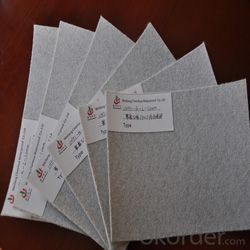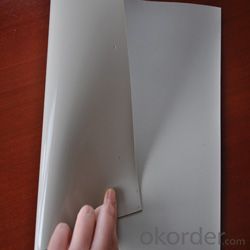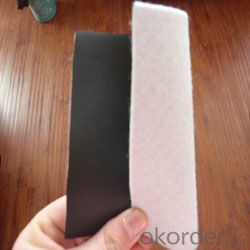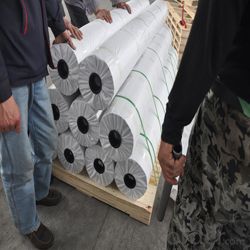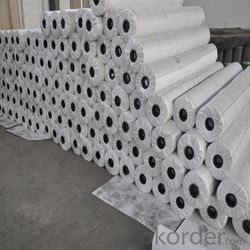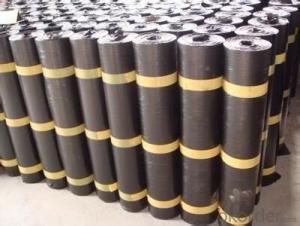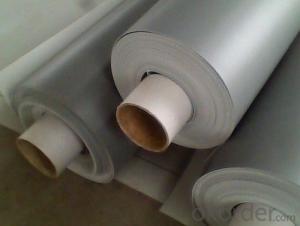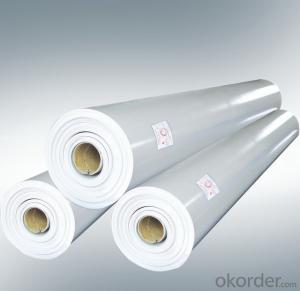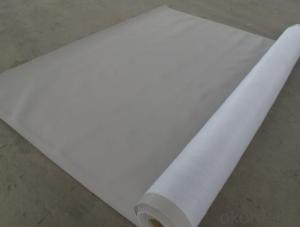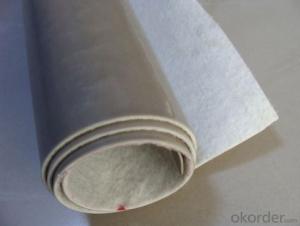Reinforced PVC waterproof membrane
- Loading Port:
- Qingdao
- Payment Terms:
- TT OR LC
- Min Order Qty:
- -
- Supply Capability:
- 100000 m²/month
OKorder Service Pledge
OKorder Financial Service
You Might Also Like
PVC (polyvinyl chloride) roof membrane
is an excellent high quality polymer waterproof sheet, made of PVC resin by adding plasticizer,
anti-UV agent, anti aging agent, and stabilizer and other processing aids through extrusion
and molding.As the highly recommended product by the Ministry of Construction, it is featured by high tensile
strength, great elongation, good stability, small shrinkage, low temperature performances, good resistance to
weathering and root penetration, and long service life.
Physical Property:
1.Good combination of high elasticity and tensile strength.
2.Fine resistance to static electricity.
3.Excellent resistance to ageing / weathering.
4.Durable,the effective age can be more than 20 years used on exposed surfaces,used on non-exposed surfaces,it can reach 50 years.
5.Fine flexibility at low temperature,adaptable to cold conditions.
6.Root-resistance,can be used on the planting roofs.
7.Fine puncture resistance, joint peel strength and joint shear strength.
8.Fine UV-resistance,no pollution to environment.
9.Easily welding,installing,secure.
10.Easy treatments to the delicate parts of corners and edges.
11.Convenient maintenance with low cost.
Polyvinyl Chloride (PVC) membrane with fiber reinforced layer
on the back is widely used in the roofs of civil buildings,
tunnels, channels, subways, highways, planting roofs, the roofs of steel
frame structure buildings, and etc.
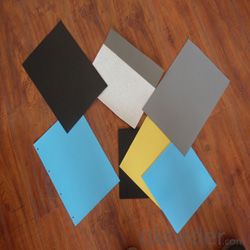
- Q: Can a waterproofing membrane be used for elevator shafts?
- Yes, a waterproofing membrane can be used for elevator shafts. Elevator shafts are susceptible to water infiltration, which can cause damage to the structural integrity of the building and the elevator system itself. Using a waterproofing membrane can help prevent water from seeping into the shaft and protect it from moisture-related problems such as corrosion, mold, and mildew. The membrane is typically applied to the walls and floors of the shaft, creating a barrier that prevents water from entering. It is important to choose a waterproofing membrane that is specifically designed for elevator shafts to ensure maximum effectiveness and durability. Additionally, proper installation and maintenance are crucial to ensure the long-term performance of the waterproofing system. Overall, using a waterproofing membrane for elevator shafts is a recommended solution to protect against water damage and maintain the functionality and safety of the elevator system.
- Q: Can a waterproofing membrane be used for a bridge deck?
- Yes, a waterproofing membrane can be used for a bridge deck. Waterproofing membranes are commonly used in bridge construction to protect the deck from water infiltration, which can cause structural damage over time. The membrane acts as a barrier against moisture, preventing it from seeping into the bridge deck and compromising its integrity.
- Q: Can a waterproofing membrane be used for a commercial building roof?
- Yes, a waterproofing membrane can be used for a commercial building roof. Waterproofing membranes are commonly used in commercial roofing systems to provide a durable and effective barrier against water penetration. These membranes are designed to withstand the challenges of commercial buildings, such as exposure to the elements, foot traffic, and mechanical equipment. They offer excellent protection against leaks, moisture damage, and other potential roofing issues, making them a suitable choice for commercial applications.
- Q: Can a waterproofing membrane be used for wastewater treatment plants or sewage facilities?
- Yes, a waterproofing membrane can be used for wastewater treatment plants or sewage facilities. These facilities often require protection against water infiltration and leakage due to the presence of large amounts of water and potentially corrosive substances. A waterproofing membrane is a versatile solution that can provide a barrier against water penetration, helping to prevent damage to the structure and ensure the proper functioning of the facility. It can be applied to various areas such as walls, floors, roofs, and tanks, helping to maintain a watertight environment and prolong the lifespan of the facility. Additionally, some waterproofing membranes are specifically designed to withstand harsh chemicals, making them suitable for wastewater treatment plants and sewage facilities where corrosive substances may be present.
- Q: Can a waterproofing membrane be used on precast zinc surfaces?
- Yes, a waterproofing membrane can be used on precast zinc surfaces. The membrane will provide an additional layer of protection against water infiltration, helping to maintain the integrity of the surface and prevent water damage.
- Q: Can a waterproofing membrane be used for outdoor applications?
- Outdoor applications can indeed benefit from the use of a waterproofing membrane. Their primary purpose is to shield against water and moisture infiltration, making them well-suited for outdoor settings where exposure to rain, snow, and other weather elements is a concern. These membranes find extensive use in various outdoor areas, including roofs, balconies, decks, and foundations, as they effectively protect against water damage and ensure long-term durability. They form a reliable barrier that keeps water out while still allowing the structure to breathe, preventing the accumulation of moisture and potential problems like mold and rot. Ultimately, utilizing a waterproofing membrane for outdoor applications is a wise decision that enhances the structure's longevity and performance.
- Q: Can a waterproofing membrane be used for stadiums and sports arenas?
- Yes, a waterproofing membrane can be used for stadiums and sports arenas. It is a commonly used solution to protect these structures from water damage and leakage. The membrane helps in preventing water penetration and effectively keeps the interior areas dry and safe.
- Q: Can a waterproofing membrane be used in parking garages?
- Yes, a waterproofing membrane can be used in parking garages. Parking garages are exposed to various weather conditions, including rain and snow, and are often subjected to heavy vehicular traffic, which can lead to moisture infiltration and damage to the structure. Therefore, it is crucial to install a reliable waterproofing system to protect the parking garage against water penetration and potential structural deterioration. A waterproofing membrane is an effective solution for parking garages as it acts as a barrier against water and moisture. It is typically made of materials such as modified bitumen, PVC, or EPDM, which are durable and resistant to water intrusion. The membrane is applied to the surface of the concrete structure, creating a protective layer that prevents water from seeping through. The waterproofing membrane not only safeguards the parking garage against water infiltration but also helps to extend the lifespan of the structure. By preventing moisture from penetrating the concrete, it reduces the risk of corrosion, reinforcing steel deterioration, and the formation of cracks. This ultimately helps to maintain the structural integrity of the parking garage and avoid expensive repairs or replacements in the future. Additionally, a waterproofing membrane can also provide added benefits such as resistance to chemicals, UV radiation, and abrasion. This makes it an ideal solution for parking garages that are exposed to harsh environmental conditions and heavy traffic. In summary, a waterproofing membrane is highly recommended for use in parking garages as it offers reliable protection against water infiltration, helps to maintain the structural integrity of the garage, and extends its lifespan.
- Q: Can a waterproofing membrane be used for below-grade applications?
- Yes, a waterproofing membrane can be used for below-grade applications. In fact, it is commonly used in construction projects to prevent water penetration in below-grade structures such as basements, foundations, and retaining walls. A waterproofing membrane is designed to provide a barrier against water and moisture, protecting the structure from potential damage caused by water infiltration. It is typically applied to the exterior side of the below-grade structure and serves as a protective layer that prevents water from seeping into the building. Waterproofing membranes for below-grade applications are specifically formulated to withstand the high hydrostatic pressure that can be exerted by the surrounding soil and water. They are usually made from durable materials such as modified bitumen, rubberized asphalt, or polyvinyl chloride (PVC), which are capable of withstanding the harsh conditions typically found below grade. Additionally, these membranes are designed to be flexible, allowing them to accommodate for any movement or settlement that may occur in the structure over time. Overall, using a waterproofing membrane for below-grade applications is an effective and reliable method to prevent water intrusion and protect the integrity of the structure.
- Q: Can a waterproofing membrane be used in stadiums or sports complexes?
- Stadiums and sports complexes can indeed benefit from the use of waterproofing membranes. It is highly advisable to employ waterproofing solutions in these types of structures to safeguard them against water damage and leaks. The purpose of a waterproofing membrane is to serve as a barrier, preventing water from infiltrating the concrete or other construction materials employed in the stadium or sports complex. This is especially crucial in regions where heavy rainfall or high humidity levels are prevalent. Implementation of a waterproofing membrane on the roofs, walls, and foundations of these edifices helps guarantee their longevity and structural integrity, while also offering a comfortable and secure environment for athletes and spectators alike. Waterproofing membranes are specifically designed to endure the pressures and movements associated with the building, making them an optimal choice for stadiums and sports complexes. Additionally, contemporary waterproofing membranes come in diverse forms, including liquid-applied or sheet membranes. This allows for flexibility in application and compatibility with various construction materials.
Send your message to us
Reinforced PVC waterproof membrane
- Loading Port:
- Qingdao
- Payment Terms:
- TT OR LC
- Min Order Qty:
- -
- Supply Capability:
- 100000 m²/month
OKorder Service Pledge
OKorder Financial Service
Similar products
Hot products
Hot Searches
Related keywords







